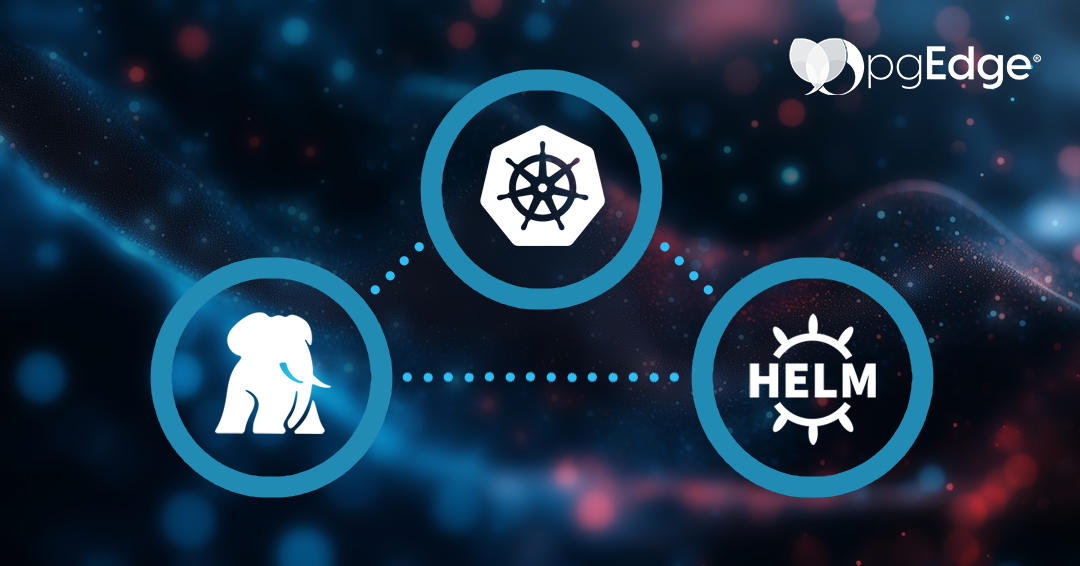pgEdge Announces CloudNativePG Integration, Simplifying Postgres on Kubernetes
New Container Images and Helm Chart Enable Seamless Deployment of pgEdge with Industry-Leading Kubernetes Operator

Alexandria, VA, November 5, 2025 — pgEdge , the leading open source enterprise Postgres company, today announced the availability of pgEdge Containers on Kubernetes built for compatibility with CloudNativePG, along with an updated pgEdge Helm chart. These releases make it easier than ever to deploy and operate pgEdge Enterprise Postgres and pgEdge Distributed Postgres on Kubernetes, leveraging the advanced maturity and community adoption of the CloudNativePG operator.
With pgEdge now fully open source under the OSI-approved PostgreSQL License, the company continues its mission to make Postgres more accessible to developers, operators, and the broader open source community.
Empowering Kubernetes Deployments with CloudNativePG
CloudNativePG is an open source Kubernetes operator that automates the lifecycle of PostgreSQL clusters using native Kubernetes resources. Recently accepted into the Cloud Native Computing Foundation (CNCF) at the Sandbox maturity level, CloudNativePG has become the community standard for running Postgres on Kubernetes, with over 4.5k GitHub stars and 58 million downloads.
Today's announcement includes two key releases that simplify pgEdge deployment on Kubernetes:
New pgEdge Postgres Container Images
pgEdge is releasing new Container images built from pgEdge Enterprise Postgres packages with support for Postgres 16 through 18, published on GitHub Container Registry as pgedge/pgedge-postgres. Two image flavors are available:
Minimal: Includes core pgEdge extensions for distributed deployments (spock, snowflake, lolor)
Standard: Adds popular extensions including pgVector, PostGIS, and pgAudit These images can be used with CloudNativePG, the official Postgres entrypoint, and Patroni, enabling broad integration with popular open source tools. Organizations can extend these images with additional extensions as needed.
Updated pgEdge Helm Chart
The new pgEdge Helm chart leverages CloudNativePG to simplify deployment and operation of distributed Postgres architectures. At a high level, this chart features support for:
Postgres 16, 17, and 18 via pgEdge Enterprise Postgres Images.
Flexible deployment options for both single-region and multi-region deployments
○ Deploy pgEdge Enterprise Postgres in a single region with optional standby replicas.
○ Deploy pgEdge Distributed Postgres across multiple regions with Spock multi-master replication.
Configuring Spock replication configuration across all nodes during helm install and upgrade processes.
Best practice configuration defaults for deploying pgEdge Distributed Postgres in Kubernetes.
Extending / overriding configuration for CloudNativePG across all nodes, or on specific nodes.
Configuring standby instances with automatic failover, leveraging Spock's delayed feedback and failover slots worker to maintain active-active replication across failovers and promotions.
Adding pgEdge nodes using Spock or CloudNativePG's bootstrap capabilities t
o synchronize data from existing nodes or backups.
Performing Postgres major and minor version upgrades.
Client certificate authentication for managed users, including the
pgedgereplication user.Configuration options to support deployments across multiple Kubernetes clusters.
Key Benefits
The new pgEdge Container Edition with CloudNativePG integration delivers:
Simplified Operations: Mature operator capabilities for orchestrating distributed Postgres in Kubernetes
Flexible Deployment: Choice of image flavors and configurable Helm chart with best practice defaults
Community Standards: Built on CNCF-backed tools with proven adoption
100% Postgres Compatible: No vendor lock-in with full open source licensing under OSI-approved PostgreSQL License
Enterprise Features: Multi-master replication, high availability, low latency, and 20+ popular extensions
Production Ready: Same-day security updates and 24×7×365 global support from seasoned Postgres experts
Multi-Cluster and Multi-Cloud Support
Most organizations deploying pgEdge Distributed Postgres operate nodes across different regions and cloud providers for performance and availability. This new release supports multi-cluster Kubernetes deployments, leveraging standard Kubernetes tools for cross-cluster networking (such as Cilium or Submariner) and certificate management.
While a single Kubernetes cluster typically operates in one region across multiple availability zones, pgEdge customers often deploy nodes in different regions for improved performance and availability, spanning multiple cloud providers at times.
"These updates mark an important step toward making pgEdge simpler, more flexible, and easier to integrate into Kubernetes environments," said David Mitchell, President and CEO at pgEdge. "Whether you're running in a single region or operating a multi-cluster deployment across clouds, pgEdge now provides the open source foundation and tools to achieve your requirements in Kubernetes."
Availability
You can explore the new images and Helm chart today on GitHub:
pgEdge Postgres Images: https://github.com/pgEdge/postgres-images
pgEdge Helm Chart: https://github.com/pgEdge/pgedge-helm
For more information and to try pgEdge for free, visit www.pgedge.com/get-started or access documentation here,
About pgEdge
pgEdge, the leading open source enterprise Postgres company, makes it easy for developers to build and deploy highly scalable and distributed database applications across global networks. Founded by industry veterans with decades of PostgreSQL expertise, pgEdge provides fully distributed PostgreSQL for high availability, delivering solutions for low latency, ultra-high availability, multi-master distributed deployments, data residency requirements, and geographic scale-out. The company offers 24×7×365 global support from seasoned Postgres experts with direct contributions to the PostgreSQL community, with optional Forward Deployed Engineer services for dedicated assistance. Customers include prominent enterprises such as Bertelsmann, Qube RT, Jobot, the European Parliament, and several U.S. government agencies.


